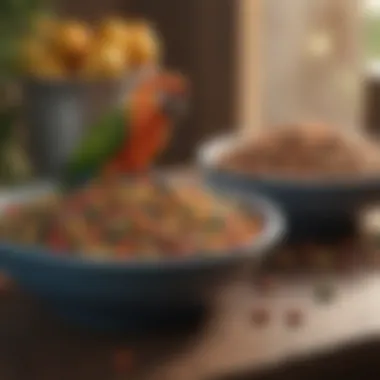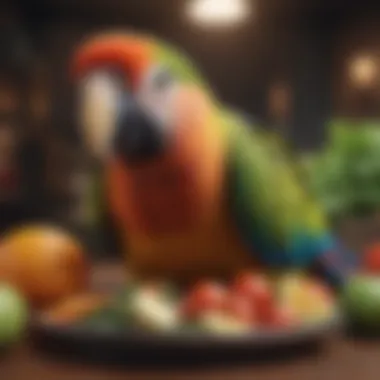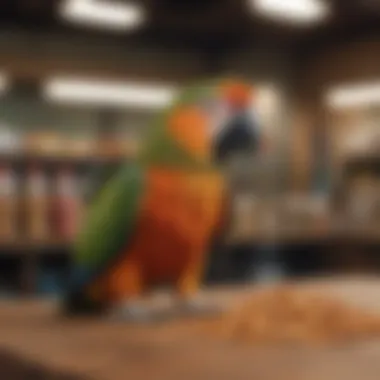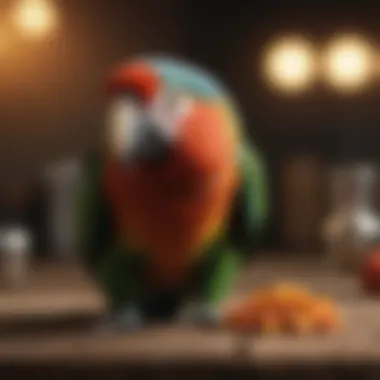Finding Quality Parrot Food: Your Local Guide


Intro
Finding the right parrot food is crucial for any owner looking to ensure their feathered friend lives a healthy and vibrant life. Nutrition directly affects a parrot’s longevity, energy levels, and overall well-being. This guide is designed for enthusiasts seeking detailed information on what to look for when purchasing parrot food in their local area.
Understanding Your Pet
Pet Behavior Basics
Understanding parrot behavior is essential before considering proper nutrition. Parrots are intelligent creatures. Their intelligence requires engagement and stimulation. Recognizing signs of boredom or distress can help you provide a balanced diet that supports both their physical and mental health. Balanced nutrition is not just about feeding them; it is about keeping their minds active too.
Common Breed Characteristics
Different parrot species have unique dietary requirements. Larger breeds, like African Greys, often require a varied diet rich in fruits, vegetables, and high-quality pellets. Smaller breeds, such as budgerigars, may have different needs, often including seeds but still requiring plenty of fresh produce. Knowing these characteristics helps in selecting the right food.
Species-Specific Needs
Every species of parrot has specific nutritional needs based on their natural habitat and diet. Some might require more protein due to their active nature, while others may need lower-fat options. Researching the dietary needs of your particular parrot breed will guide you in sourcing the ideal food options.
Pet Care and Maintenance
Feeding Guidelines
Feeding a parrot is about more than simply providing food. The right hand-fed or pelleted diet can ensure they receive proper nutrition. A common recommendation is to fill approximately 75% of their diet with high-quality pellets, complemented by fresh fruits and vegetables. Do not forget to vary their diet to prevent boredom and encourage exploration of different textures and tastes.
Grooming Essentials
Proper grooming goes hand-in-hand with nutrition for holistic care. Regular feather maintenance helps in preventing issues. Ensure your parrot has appropriate toys and items to chew on, which not only aids in beak health but also complements their feeding habits. Grooming does affect their overall health and aids in proper feeding habits, ensuring they do not pick up undesirable behaviors.
Hygiene Practices
Maintaining hygiene in feeding areas is also critical. Regularly cleaning bowls and changing food daily helps avoid bacteria growth that can lead to illness. Washing toys frequently prevents the buildup of germs, which can disrupt their health, affecting their appetite and general well-being.
Health and Wellness
Routine Vet Check-ups
Regular vet visits help in monitoring your parrot’s health. They can provide advice on dietary matters and required supplements. This prevents deficiencies, which could lead to more severe health issues over time. Schedule these appointments proactively to catch potential problems early.
Vaccination Needs
Vaccines play a role in maintaining a healthy parrot. Some owners might overlook this aspect but protecting your bird can prevent serious diseases which could impact their ability to eat and digest food properly. Make sure you consult with an avian veterinarian for a schedule.
Recognizing Signs of Illness
Awareness of any changes in behavior or eating habits can signal health issues. If your parrot becomes less interested in food or shows a change in their droppings, consult your vet. Ignoring these early signs can lead to severe implications.
Enrichment and Activities
Indoor vs.
Outdoor Activities
Engaging your parrot in both indoor and outdoor activities is essential for their development and happiness. Outdoor time can expose them to new sights and sounds, while indoor activities should include interactive toys to stimulate their minds positively. Parrots benefit from varied environments, directly influencing their eating behaviors.
Interactive Toys and Games
Providing them with challenging toys can improve their mental well-being. Toys that encourage foraging or problem-solving can promote a healthy mindset, making them more likely to engage with food. Interactive feeding methods are not just enjoyable; they also spur natural feeding instincts.
Socialization Opportunities
Encouraging your parrot to socialize, whether with humans or other birds, can have a positive impact on their behavior and feeding habits. A well-socialized parrot tends to display healthier eating patterns and less anxiety when introduced to new foods, broadening their dietary range.
Good nutrition and proper care are integral to a justifying enriched life for parrots.
Importance of Proper Nutrition for Parrots
Proper nutrition is a cornerstone of parrot care, as the right diet can significantly impact their overall health and longevity. Birds, especially parrots, require a diverse range of nutrients that aid in their growth, development, and daily activities. A well-balanced diet tailored to the unique requirements of parrots ensures not only their physical health but also their mental enrichment. Given their active nature, feeding the right nutrition helps to maintain their energy levels and supports their social behaviors.


Understanding Parrot Dietary Needs
Parrots in the wild consume a varied diet that consists of seeds, nuts, fruits, and vegetables. However, domesticated parrots often require careful dietary planning to meet their nutritional needs. Each species has its own specific requirements, influenced by factors such as size, age, and activity level, making it essential for owners to research their parrot’s particular species.
Practical guidance includes understanding the need for protein, vitamins, and minerals. Proteins are crucial for muscle function and feather production. Essential fatty acids found in nuts and seeds support skin health and maintain a functioning immune system. Vitamins, particularly vitamins A, D, and E, contribute to vision, bone health, and antioxidant protection, respectively. Therefore, a mix of these elements in their diet is necessary for optimal health.
Consequences of Poor Nutrition
Neglecting the nutritional needs of parrots can lead to significant health issues. A diet lacking in variety can result in nutritional deficiencies, which affect not only physical conditions but also behavioral issues. Common health problems associated with poor nutrition include obesity, fatty liver disease, and feather plucking. For instance, inadequate calcium can lead to weak bones and egg-laying issues in females.
Moreover, psychological effects must not be overlooked. Inadequate stimulation from a monotonous diet can trigger boredom and stress, which can manifest in aggressive or destructive behaviors. The importance of nutrition cannot be understated; it is an essential factor in both the physical and mental well-being of a parrot. As such, owners must prioritize providing a balanced diet tailored to their pet’s specific needs.
Types of Parrot Food Available
Understanding the types of parrot food available is crucial for any bird owner. A balanced diet can significantly affect a parrot's health and longevity. Different food types offer distinct nutritional benefits and considerations. For example, some foods provide necessary vitamins, while others deliver essential fats and proteins. Knowing what these categories entail helps pet owners make informed decisions, ensuring their birds thrive.
Seed-based Diets
Seed-based diets have traditionally been a primary food source for many parrots. While seeds can be part of a healthy diet, they should not be the sole component. Seeds often lack some essential nutrients that parrots require. Due to their high fat content, many seeds can contribute to obesity if over-consumed. It is advisable to mix seeds with other types of food to create a more balanced diet.
Some popular seeds include sunflower seeds, safflower seeds, and millet. When offering seeds, be conscious of the portion sizes and consider rotating them with other food types. This will help ensure that your parrot receives a more comprehensive range of nutrients.
Pellets and Formulated Diets
Pellets and formulated diets are carefully designed to meet the specific nutritional needs of parrots. These foods often contain a blend of grains, fruits, vegetables, and various vitamins and minerals. Their balanced composition makes them a more reliable choice for specific dietary needs.
Choosing a high-quality pellet brand can simplify your feeding routine. Opting for products without artificial dyes and fillers is essential for maintaining your parrot's health. Additionally, pellets should account for a large percentage of your bird's diet, complemented with fresh foods. Make sure to introduce new pellets gradually, allowing your parrot to adjust without stress.
Fresh Fruits and Vegetables
Fresh fruits and vegetables are vital for providing essential vitamins and minerals. These foods can add variety to your parrot's diet and keep them engaged during feeding. Examples include leafy greens, carrots, bell peppers, and berries. Each of these options brings unique health benefits. Leafy greens are high in calcium, while berries are rich in antioxidants.
When offering fresh produce, always wash them thoroughly to remove pesticides or contaminants. Cut them into manageable pieces, as parrots may struggle with larger chunks. Keep in mind that fresh foods should be served in moderation, as they can spoil quickly.
Nuts and Treats
Nuts can serve as an excellent source of protein and healthy fats for parrots. They are energy-dense and should be offered occasionally rather than as a primary food source. Almonds, walnuts, and hazelnuts are suitable options. Just be careful with portion sizes, as excess fat can lead to health issues.
Additionally, some parrot owners enjoy giving their birds occasional treats. These might include dried fruits or fortified bird treats. Make these a small part of your bird's overall diet, ensuring the primary nutrition comes from more balanced food sources.
By understanding these different types of parrot food available, you can better support your companion's dietary needs, leading to improved overall health and happiness.
Where to Find Parrot Food Near Me
Finding quality parrot food is crucial for every parrot owner's journey. The right nutrition keeps parrots healthy, happy, and active. Therefore, knowing where to locate this food can directly impact their wellbeing. There are various avenues to explore, each having their own benefits. This allows pet owners not only to find food but also to discover options suitable for their specific needs.
Local Pet Supply Stores
Local pet supply stores are often the first place parrot owners think of when searching for food. These establishments typically stock a range of products, including seeds, pellets, and other essentials for bird care.
The advantages of visiting these stores include the opportunity to physically assess the products before purchase. Owners can check the freshness and quality of the food. Additionally, store staff can provide valuable advice, helping to choose the right nutritional options for specific parrot species.
Many local stores also host events or workshops focused on proper feeding and care of pets, which can enhance your understanding of parrot nutrition.
Specialty Bird Shops
Specialty bird shops cater specifically to avian needs. Visiting these shops can yield an impressive selection of quality food types, often not found in general pet supply stores. This makes them an excellent resource for discerning pet owners.
The knowledgeable staff in specialty stores can assist in finding age and species-specific food options. They can provide insights into various brands and formulations, ensuring you make informed decisions. Incorporating specialized diet recommendations could greatly benefit your parrot’s health.
Farmers Markets and Organic Stores
Farmers markets and organic stores often present unique opportunities for obtaining fresh food options. They may stock organic fruits, vegetables, and even nuts, ideal for a parrot's diet. Fresh produce is typically more nutritious than processed alternatives. Thus, these markets can complement commercial food offerings.
Additionally, the local farmers might have insights into how their products are grown, which can assure you of their quality and safety. Supporting local farmers also fosters a sense of community, making your shopping experience more meaningful.
Online Retailers


In the digital age, online retailers have become a popular choice for obtaining parrot food. Websites like Amazon offer a vast selection of brands and products. This choice allows for convenient comparisons and reviews before making a purchase.
One benefit of buying online is the ability to access specialty foods that might not be available in local stores. You can also take advantage of subscription services that ensure you never run low on supplies. However, always pay attention to shipping costs and delivery times to avoid running out of food unexpectedly.
Remember, selecting the right source for parrot food goes beyond convenience. It involves understanding the nutrition and quality that will best support your pet's health.
Considerations for Selecting the Right Parrot Food
Selecting the right parrot food goes beyond simply choosing what looks appealing on the shelf. It is a crucial aspect of parrot care that influences overall health, longevity, and behavior. Every parrot species has unique dietary needs that require careful consideration. Understanding these needs will help ensure that your feathered friend receives all essential nutrients in their diet.
Age and Species-Specific Needs
Different parrot species have dietary requirements that can vary greatly. Young birds, for instance, may need a different combination of vitamins and minerals compared to fully grown ones. A macaw has needs that differ widely from a cockatiel. Here are some key points to consider:
- Age Considerations:
- Species Needs:
- Juvenile birds require higher protein and calcium levels to support growth.
- Adult parrots benefit from a balanced diet high in fiber.
- Larger species like African greys may require specific ratios of seeds to pellets, while budgies can thrive on a different blend.
Researching the unique nutritional profiles for different parrot species will better prepare you for making informed choices.
Quality Standards in Pet Food
Not all parrot food is created equal. Quality standards determine how nutritious and safe the food is for your pets. Some standards to be aware of include:
- Regulatory Compliance: Look for products that comply with guidelines set by organizations like AAFCO (Association of American Feed Control Officials).
- Ingredient Sourcing: Ingredients should be sourced responsibly. Brands that specify where their ingredients come from often provide higher quality products.
- Manufacturing Practices: Foods produced in facilities following best practices for hygiene and quality control are preferred.
Prioritizing quality standards will contribute to a better diet and ultimately healthier birds.
Avoiding Fillers and Artificial Additives
When reading ingredient lists, be vigilant about fillers and artificial ingredients. Fillers often include items that do not provide any nutritional benefits. Ingredients to watch out for include:
- Excessive Grains: Grains are fine in moderation, but if they form the majority of the diet, it can lead to health issue.
- Artificial Colors or Flavors: These do not add nutritional value and may lead to allergies or sensitivities.
- Preservatives: Some preservatives can be harmful if consumed regularly. Look for natural options instead.
The goal is to provide your parrot with a diet that mimics their natural feeding behavior while ensuring it is also free from harmful substances.
Always read labels carefully and choose brands that are reputable and transparent about their ingredients. Your parrot deserves the best possible nutrition to thrive.
The Impact of Nutrition on Parrot Health
Proper nutrition plays a crucial role in the overall health and well-being of parrots. Understanding the relationship between a parrot's diet and its health can significantly enhance their quality of life. This section delves into the signs of nutritional deficiencies and outlines the benefits of maintaining a balanced diet.
Signs of Nutritional Deficiencies
Recognizing the signs of nutritional deficiencies in parrots is essential for any pet owner. These signs can manifest in various ways, often indicating that a bird's diet lacks certain vital nutrients. Here are some common indicators to watch for:
- Feather Problems: Dull, brittle, or uneven feathers can signal a lack of essential fatty acids, vitamins, or minerals.
- Behavior Changes: Increased irritability, lethargy, or unusual behaviors may suggest nutritional imbalance.
- Poor Beak and Nail Health: A crumbly beak or unkempt nails can indicate deficiencies in calcium or other key nutrients.
- Digestive Issues: Diarrhea or abnormal droppings could arise from poor dietary choices.
Addressing these signs promptly is important. Often, a consultation with an avian vet can help determine the exact issue and develop a suitable dietary plan.
Benefits of a Balanced Diet
Feeding parrots a well-rounded, balanced diet offers numerous health benefits. Some advantages include:
- Enhanced Immune System: A nutrition-rich diet supports a robust immune system, making parrots less susceptible to illnesses.
- Optimal Weight Management: A balance of fruits, vegetables, and formulated pellets helps maintain proper body weight, preventing obesity.
- Improved Lifespan: Parrots that receive adequate nutrition typically enjoy longer, healthier lives.
- Better Mental Health: A diverse diet provides mental stimulation and can prevent boredom, reducing behavioral issues.
In summary, the nutritional choices made for parrots have a direct impact on their health. Regular monitoring for signs of deficiencies and adhering to a balanced diet are vital responsibilities for bird owners. Staying informed about nutrition can have lasting benefits for both the bird and its owner.
“Nutrition forms the foundation of health in parrots. Inadequate diets can lead to severe health complications.”
For more insights on parrot nutrition, consult reliable sources like Wikipedia and Britannica.
Storing Parrot Food Effectively
Proper storage of parrot food is crucial for maintaining its quality and nutritional value. If done right, it extends the shelf life and ensures your bird benefits from the optimal vitamins and minerals in their diet. Parrots thrive on fresh foods, which means that how you store their food can significantly impact their health and well-being.


Best Practices for Storage
To effectively store parrot food, consider the following best practices:
- Use Airtight Containers: Invest in airtight containers. This minimizes exposure to air, which can lead to spoilage and loss of nutrients.
- Keep in a Cool, Dry Place: Store food in a cool and dry environment. Excess heat and humidity can promote mold growth.
- Separate Different Food Types: If offering various food types like seeds, pellets, and nuts, store them separately. This prevents contamination and helps maintain flavor integrity.
- Check Expiry Dates: Regularly check expiry dates on packaging. Food past its prime can be harmful to your parrot.
By implementing these practices, you can ensure that your parrot's food remains fresh and safe for their consumption.
Keeping Food Fresh and Nutritious
To maintain the freshness and nutritional quality of parrot food, follow these tips:
- Refrigeration for Perishables: Some fresh foods, like fruits and vegetables, should be refrigerated to keep them from spoiling.
- Monitor for Insects: Regularly check food for signs of insects or pests. If found, dispose of the infested food immediately to prevent spreading.
- Rotate Food Stock: Practice the FIFO method (First In, First Out). Use older food before opening new packages, ensuring nothing sits too long.
- Avoid Sunlight: Keep your parrot food away from direct sunlight. Ultraviolet rays can degrade vitamins and spoil food faster.
Keeping food fresh and nutritious is a shared responsibility. By following the right techniques, you can improve the quality of your parrot's diet, supporting their health and happiness.
“Proper storage is as vital as the selection of quality food itself.”
These storage techniques are straightforward yet effective. By applying them, you help to ensure that your parrot receives the best possible nutrition.
Resources for Parrot Nutrition
Understanding parrot nutrition is essential for ensuring the well-being of these intelligent birds. This section will provide valuable resources that can aid in selecting and maintaining a proper diet for your parrot. Proper resources can enhance your knowledge and help you make informed decisions about feeding practices.
Books and Literature
Books and literature can offer in-depth insights into avian nutrition. Reading works by renowned experts provides a foundation of knowledge on parrot dietary needs. Some valuable titles to consider include The Parrot Companion and Guide to a Happy, Healthy Parrot.
These resources often include:
- Detailed analysis of nutritional requirements for various parrot species.
- Information about common dietary problems and how to avoid them.
- Recipes for home-prepared parrot food, enhancing the feeding variety.
With these texts, you can expand your understanding and adapt best practices into your parrot’s diet.
Consulting Veterinarians
Consulting a veterinarian is crucial when it comes to your parrot's diet and health. A veterinarian with experience in avian species can provide tailored advice based on your bird's individual needs. In your discussions, focus on specific questions about:
- Age-related dietary requirements
- Nutritional deficiencies identified through behavioral or physical signs
- Recommended brands or formulations that suit your parrot's health
Regular check-ups will ensure that your feeding strategy aligns with veterinary insights. This relationship can profoundly impact the health of your pet.
Online Forums and Communities
Online forums and communities can serve as a rich source of shared knowledge. Websites like Reddit and Facebook host groups dedicated to parrot care, where owners share experiences, tips, and recommendations regarding food choices.
- Engage with members to learn about different feeding methods.
- Ask for advice on specific food brands that others recommend.
- Share your own experiences to foster communal knowledge.
These platforms often highlight practical solutions to common issues encountered by parrot owners, providing insights that you may not find in traditional literature.
Remember, effective parrot nutrition is a multi-faceted aspect of pet care. These resources will empower you to make informed choices that benefit your parrot’s well-being.
End
In this guide, the importance of understanding and prioritizing proper nutrition for parrots cannot be overstated. The significance of this topic lies in the direct impact that diet has on the overall health and longevity of these avian companions. Whether it is about ensuring an optimal range of nutrients or recognizing the signs of nutritional deficiencies, parrots thrive on a well-balanced diet tailored to their specific needs.
Recap of Nutritional Needs
Parrots require a varied diet that includes seeds, pellets, fresh fruits, and vegetables to meet their nutritional requirements. Each species may have unique dietary needs, which must be considered when selecting food. Key nutrients for parrots include:
- Proteins: Essential for growth and repair.
- Vitamins: Important for immune health and digestion.
- Minerals: Necessary for bone strength and overall function.
- Fiber: Supports healthy digestion and prevents obesity.
By catering to these needs, pet owners enhance their parrot's quality of life and prevent numerous health concerns associated with poor nutrition.
Encouragement to Prioritize Nutrition
Prioritizing nutrition is not just a responsibility but a crucial aspect of parrot ownership. A well-fed parrot is often more active, social, and exhibits better plumage. Investing time to explore and understand the right foods makes a significant difference in their well-being.
- Research Eating Habits: Make efforts to learn which foods are beneficial for your parrot's species.
- Regular Veterinary Check-ups: Consult with avian veterinarians to tailor diet plans suited to your parrot’s unique needs.
- Engagement in Feeding: Activley participate in feedig routines to create a stronger bond with your parrot.
Prioritizing these elements not only ensures they live longer but also leads to a happier, more fulfilling life for both the pets and their owners.
A balanced diet is foundational for health and happiness.







